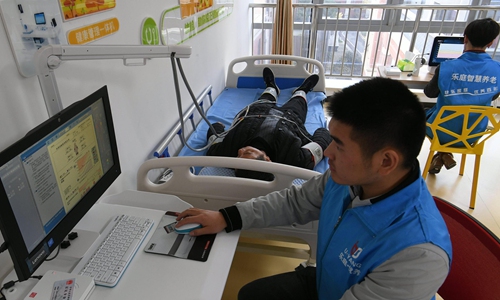HOME >> CHINA
Senior care professionals urgently needed nationwide
By Li Qiao Source:Global Times Published: 2019/11/26 19:43:40

Working staff from a residential community in Hefei, East China's Anhui Province use internet of Things to monitor the health data of a senior resident. Photo: VCG
By the end of 2018, more than 40 million of China's elderly population was disabled. The senior care problem is a sore point for Chinese society, China News Radio reported in September.
China is making great efforts to fill the talent gap and improve elderly care services.
According to international practice, one nurse is needed for every three elderly people. Based on 40.6 million disabled elderly people in China, the demand for nursing staff is at least 10 million. In 2017, 156 higher vocational schools in China were registered to offer elderly services and management majors, with a total enrollment of 9,658 students only, the Xinhua News Agency reported in April 2018.
China's Ministry of Education (MOE) is encouraging qualified colleges and universities to build on the subject of elderly service management.
A large number of high-level professionals who are familiar with the subject of gerontology, enthusiastic about the management of old-age services, and loving and willing to serve the elderly are urgently required.
According to a report released on MOE's website, as of September 2018, health service and management majors have been set up at the undergraduate level, with 56 colleges and universities offering students the opportunity to engage in health service management including elderly services after graduation.
There is no geriatric service management major in the current catalogue of undergraduate majors.
Su Hongli, a mother in Xi'an, Northwest China's Shaanxi Province, whose son is in his last year of high school, told the Global Times that she will be worried about her son's career development and income level after graduation if her son really applies for the geriatric service management major.
"The recognition of society is also a concern. If the society can attach importance to the senior care the same as the child care, supporting the old won't be a big problem," Su said.
Su supports China applying more strength to improve senior care.
She believes that more preferential policies and investment on the major development will enable students who are interested with senior care management to receive professional education.
Besides cultivating talents, China launched long-term care insurance system providing nursing safeguards or economic compensation when old people appear seriously incapacitated.
It was first explored in Qingdao, East China's Shandong Province in 2012. In 2016, it was piloted in 15 cities in China, and nearly 50 cities volunteered to provide nursing insurance services for disabled elderly people, People's Daily reported on Friday.
By the end of June 2018, China's long-term care insurance pilot program had covered 57 million people, and 184,500 had benefited, as reported.
On Friday, China has officially lifted the permit for the establishment of old-age care institutions, boosting the number of nursing homes, according the Jiemian News.
RELATED ARTICLES:
Posted in: IN-DEPTH,CHINA FOCUS